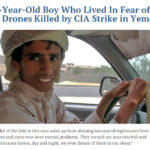Mohammed Tuaiman al-Jahmi was 13 years old.
—
He lived in al-Zur village in the Marib province of Yemen, and in 2011 anAmerican drone strike killed his father and older brother while they wereherding their camels.
Since then, ashe told The Guardian lastSeptember, he lived in constant fear of drones. They even appeared in hisnightmares. “I see them every day and weare scared of them,” Mohammed said. “A lot of the kids in this area wake up
from sleeping because of nightmares from them and some now have mental
problems. They turned our area into hell and continuous horror, day and night,
we even dream of them in our sleep.”The drone’s indiscriminate killing—remember, it’s
official US policy to count any military-aged male killed as a terrorist,
regardless of (the absence of) actual evidence)—was particularly concerning
and confusing to him: “They tell us that these drones come from bases in Saudi
Arabia and also from bases in the Yemeni seas and America sends them to kill
terrorists, but they always kill innocent people. But we don’t know why they
are killing us.”“The elders told us
that it’s criminal to kill the civilians without distinguishing between
terrorists and innocents,” he added, “and
they kill just on suspicion, without hesitation.”Just a couple months after the Guardian interview, Mohammed’s confusion would cease—not because of
a reformed American drone policy, but because he himself was
killed in a drone strike on January 26.Predictably, Mohammed and the two men who were also burned
to death in the car the missile struck were
labeled terrorists. But he “wasn’t a member of al-Qaida,” Mohammad’s brother
Maqdad says. “He was a kid.”The family is so dedicated to proving their brother’s
innocence that they’ve vowed to sue if need be. “After our father died,” Maqdad
continues, “al-Qaida came to us to offer support. But we are not with them.
Al-Qaida may have claimed Mohammed now but we will do anything—go to court,
whatever—in order to prove that he was not with al-Qaida.”Maqdad is equally determined to get the American government to
admit its crimes against his family: “We live in injustice and we want the
United States to recognize these crimes against my father and my brothers. They were innocent people, we are weak,
poor people, and we don’t have anything to do with this.”Though he still rejects allegiance to al-Qaida, after seeing
his brother’s body “completely burned, like charcoal,” it is no surprise if
Maqdad is no friend to the United States.—
Mohammed Tuaiman al-Jahmi was 13 years old.

Just another WordPress site
